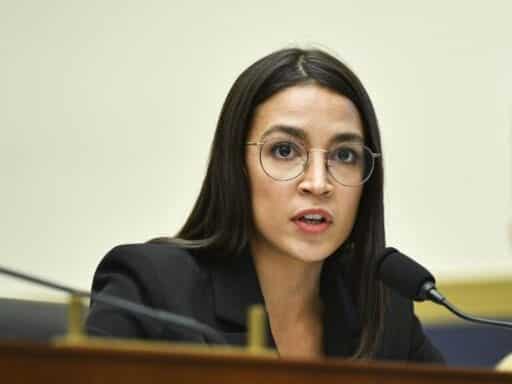Zuckerberg’s answer on whether Alexandria Ocasio-Cortez can falsely claim Republicans voted for the Green New Deal: Probably.
If Alexandria Ocasio-Cortez or any other Democrat wants to run an ad on Facebook saying a Republican lawmaker supports the Green New Deal, there’s nothing Mark Zuckerberg is going to do about it. Well, probably.
On Wednesday, Zuckerberg appeared in a hearing before the House Financial Services Committee that was supposed to be about Facebook’s Libra crypto project but that wound up being about pretty much any Facebook-related issue under the sun. Members of Congress grilled the executive on the litany of controversies and questions the social media giant is facing, including hate speech, data privacy, diversity, content moderation, and more. Top of mind for some in Congress — not to mention the public — is Facebook’s policy that allows politicians to lie in their political ads. And Ocasio-Cortez, the first-term Democrat from New York, drilled down on the matter.
“You announced recently that the official policy of Facebook now allows politicians to pay to spread disinformation in 2020 elections and in the future. So I just want to know how far I can push this in the next year,” Ocasio-Cortez said.
She asked whether she could pay to target predominantly black zip codes and advertise the wrong election date, to which Zuckerberg replied that such an ad would be barred. “If anyone, including a politician, is saying things that can cause … that is calling for violence, or could risk imminent physical harm, or voter or census suppression, when we roll out the census suppression policy, we will take that content down,” he said.
“So there is some threshold where you will fact-check political advertisements. Is that what you’re telling me?” Ocasio-Cortez said.
Zuckerberg’s point makes sense — providing a wrong date for an election is one fairly clear voter suppression tactic.
“So, you won’t take down lies or you will take down lies? I think that’s just a pretty simple yes or no.”
Complete exchange between @RepAOC @AOC and Mark Zuckerberg at today’s House Financial Services Cmte hearing.
Full video here: https://t.co/heT7Psnlp1 pic.twitter.com/0iiWtfU5gQ
— CSPAN (@cspan) October 23, 2019
But then she followed up with a different scenario: What about ads targeting Republicans in primaries saying that they had voted for the Green New Deal, which she has championed? Zuckerberg asked her to repeat the question. Here’s the exchange that followed:
Ocasio-Cortez: Would I be able to run advertisements on Facebook targeting Republicans in primaries saying that they voted for the Green New Deal? I mean, if you’re not fact-checking political advertisements, I’m just trying to understand the bounds here, what’s fair game.
Zuckerberg: Congresswoman, I don’t know the answer to that off the top of my head, I think probably.
Ocasio-Cortez: You don’t know if I’ll be able to do that.
Zuckerberg: I think probably.
Ocasio-Cortez: Do you see a potential problem here with a complete lack of fact-checking on political advertisements?
Zuckerberg: Well, Congresswoman, I think lying is bad, and I think if you were to run an ad that had a lie in it, that would be bad. That’s different from it being … in our position, the right thing to do to prevent your constituents or people in an election from seeing that you had lied.
She continued to press him to say whether Facebook would take down political ads containing flat-out lies. “In most cases, in a democracy, I believe that people should be able to see for themselves what politicians that they may or may not vote for are saying and judge their character for themselves,” Zuckerberg said.
The controversy over Facebook’s political ads policy isn’t going away
Facebook’s political ads policies have come under heavy scrutiny in recent weeks.
Much of the dustup was ignited when President Donald Trump’s reelection campaign was allowed to run an ad on Facebook — and multiple other platforms — making false claims about former Vice President Joe Biden. It’s all snowballed from there. Many politicians, members of the media, and others have roundly criticized Facebook and other social media platforms for refusing to take down fake political ads. Sen. Elizabeth Warren (D-MA), who has targeted Facebook in her 2020 presidential bid, went as far as to take out a fake ad on Facebook to highlight the implications of its policies.
Facebook and Zuckerberg, however, have stuck with their approach to political advertising despite the pushback. Last week, Zuckerberg delivered a speech at Georgetown University that attempted to defend the company and his worldview on speech. “While I certainly worry about an erosion of truth, I don’t think most people want to live in a world where you can only post things that tech companies judged to be 100 percent true,” he said. “Banning political ads favors incumbents and whoever the media chooses to cover.”
And on a call with reporters earlier this week, Zuckerberg fielded questions from reporters about the matter as well and sang a similar tune. “I just think that in a democracy people should be able to see for themselves what politicians are saying, and I think that people should make up their own minds about which candidates are credible and which candidates have the kind of character that they want to see in their elected officials,” he said. “And I don’t think those determinations should come from tech companies.”
Facebook doesn’t need to run political ads; they’re not a significant portion of its business. But the company appears determined to leave its policy unchanged. So prepare for some your-Republican-Congressman-supports-the-Green-New-Deal ads from Democrats in 2020. Maybe.
Author: Emily Stewart
Read More



